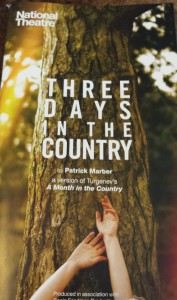And so, on Saturday, to the National Theatre to see Patrick Marber’s new, much-lauded version of Turgenev’s ‘Month in the Country’ at the Lyttleton. Compressed into three hot summer days, this comedy of manners follows the inhabitants of a large Russian country  house and estate, who learn all sorts of lessons in love when a handsome new young tutor comes to stay, to teach the withdrawn and lonely son of the house.
house and estate, who learn all sorts of lessons in love when a handsome new young tutor comes to stay, to teach the withdrawn and lonely son of the house.
‘It’s very Russian,’ said the man sitting behind me during the interval. Well, yes, it’s by Turgenev, I wanted to respond. I didn’t. In part because I’m English and it would be presumptuous (he might, after all, know much more than I do about Russian drama) but also because I think I know what he meant. This is familiar territory. There is the large Russian dacha, complete with serfs, its bored and semi-dissolute owners going slightly mad, the impending storm of Bolshevism already on the horizon and lots of tortured, unrequited passion. Pre-dating Chekov’s later and best known plays, it’s easy to see Turgenev’s influence on the later dramatist in ‘A Month…’. The Three Sisters Prozorova belong in this milieu, as do the Ranevskayas, though it is more prosperous than penurious, that orchard won’t have to be sold off just yet. I found this version of the play insightful, witty and generous of spirit, intelligent as well as passionate and, at times, very funny indeed.
Mark Gatiss uses physical angularity to great effect as the world-weary, cynical, but endearing Doctor Shpigelsky, whose straitened means and emotional isolation prompt him to make an unorthodox proposal of marriage. Or ‘more of an arrangement’ as he prefers to call it. Gatiss is excellent, one feels the character’s perplexity and vulnerability when he is refused ( quite rightly, by Lizaveta the most sensible character among them, who seems to me to be a slightly shop-soiled Austen heroine accidentally fallen among intense Slavs ). But the Doctor is well-armoured.
He is matched by John Simm, as Rakitin. Long standing boyhood friend of Arkady, the wealthy owner of the estate and a besotted admirer of Natalya, Arkady’s wife, he is a man who worships his own enslavement by love at the same time as hating it. Rakitin is a man of the world, but one who loves his friend and who loves Natalya, as well as desiring her. His long-standing, dramatic passion is just as real as the other types of love on display, more so, even, in Simm’s multi-layered performance. He manages to be languid, witty and acute and impassioned, bitter and tortured at the same time. And, strange to say about a character who desperately desires to seduce his best friend’s wife, decent. This an acting tour de force.
a besotted admirer of Natalya, Arkady’s wife, he is a man who worships his own enslavement by love at the same time as hating it. Rakitin is a man of the world, but one who loves his friend and who loves Natalya, as well as desiring her. His long-standing, dramatic passion is just as real as the other types of love on display, more so, even, in Simm’s multi-layered performance. He manages to be languid, witty and acute and impassioned, bitter and tortured at the same time. And, strange to say about a character who desperately desires to seduce his best friend’s wife, decent. This an acting tour de force.
Amanda Drew, as Natalya, is suitably alluring, intelligent and bored. In turn haughty and vulnerable she is easily prey to an unsuitable and unlooked-for first love. Natalya has sufficient self-knowledge to see her ludicrous situation, but cannot help herself, any more than can Rakitin, Vera or her older suitor, struck dumb by shyness, whom she agrees to marry in a fit of pique. Theirs will be another almost unbearable marriage.
The other performers are uniformly excellent, though a little over-shadowed by Simm and Gatiss. The staging is atmospheric and minimal. ‘Three Days in the Country’ runs until 21st October. Ticket prices range from £15 to £55. Go and see it if you can manage to get hold of one.
If you enjoyed reading this review you might also enjoy Eric Ravilious Festival de Jerez II Festival de Jerez


 RSS – Posts
RSS – Posts